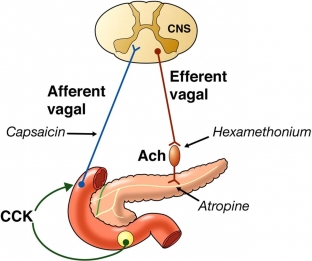Cholecystokinin (CKK) – it is a neuropeptide hormone produced by the intestinal mucosa, namely the duodenum and proximal jejunum. It is not as well known in weight loss circles as the hormones ghrelin and leptin, which are responsible for the feeling of hunger and satiety, but it plays an equally important role in the process of losing weight. You can find out exactly what role cholecystokinin plays in human eating behavior and other body functions from the article prepared for you by estet-portal.com. We will also tell you how you can optimize the production of this hormone.
Cholecystokinin: what role do fats play in the weight loss process
Fats stimulate the production of cholecystokinin in the intestines. This neurotransmitter peptide can be found in the human digestive system and brain. He is responsible for:
• reduction in the release of hydrochloric acid;
• stimulation of the pancreas;
• stimulation of digestive enzymes;
• stimulation of bile secretion;
• stimulation of the contraction of the gallbladder;
• relaxation of the sphincters of the bile ducts;
• vagus nerve stimulation.
The lack of this substance in the body is fraught with:
• disorders in the gallbladder;
• violation of the flow of bile into the duodenum;
• disruption of the gastrointestinal tract as a whole.
In addition, this hormone is involved in maintaining calmness, regulating sleep, suppressing fear and pain, as well as mental stress.
Cholecystokinin plays an equally important role in satiety as does leptin.
Initially, experts believed that SCM is involved in the regulation of the pancreas and intestinal motility. However, it was soon experimentally established that this hormone produced in the intestines is one of the main informants of the brain that enough food has been received and the meal can be completed. The same function is performed by YY peptides, which:
• affect the vagus nerve;
• affect the hypothalamus.
Activation of the synthesis of this hormone occurs after the ingestion of fats and certain amino acids into the small intestine. The secreted HSC binds to vagus nerve receptors and relays information about hunger suppression.
Cholecystokinin and the psyche: why you should not abuse fats
Exceeding the normal level of cholecystokinin in the body is associated with a disorder called causeless panic. This was shown by experiments involving volunteers as early as 1989. Unreasonable panic is predominantly affected by women at a young age, and the most common cause of this disorder is a genetic defect, as a result of which a person becomes more sensitive to the effects of HCS.
For the above reason, it is highly discouraged to abuse fatty foods. Experiments conducted on rodents have shown that a long-term predominance of fatty foods in the diet makes experimental animals more anxious and cowardly. This is due to an increase in the transcription factor CREB, which activates genes that regulate the synthesis of dopamine (responsible for the feeling of pleasure) and corticosterone (one of the stress hormones).
Thus, a vicious circle arises: the fatter the food, the more acute the stress; the more acute the stress, the more fatty foods you need to release dopamine.
If you try to break this circle and abruptly give up fat, it becomes more difficult to deal with stress due to a lack of dopamine. Perhaps this vicious cycle is one of the reasons for the difficulty in losing weight.

The role of cholecystokinin in the formation and elimination of addictions
Cholecystokinin has antidepressant properties. Fluctuations in the level of this hormone affects the behavior and mood of a person. Since cholecystokinin is able to suppress excess dopamine releases, it is involved in the reward mechanisms that are one of the components of addiction formation.
When the level of cholecystokinin decreases, a person is more prone to addiction to addictive substances (alcohol, drugs).
Cholecystokinin is able to normalize neurochemical processes in the brain and reduce the severity and duration of withdrawal after withdrawal from an addictive substance. Therefore, it is used in the treatment of drug addiction.
How to Optimize Cholecystokinin Production Through Nutrition
So, we found out that the normal level of cholecystokinin – it is a healthy feeling of fullness, sleep, suppression of the formation of addictions, normal eating behavior and a healthy psyche. How to prevent abnormal cholecystokinin levels?
Remember: Adequate amount of fat – it is a feeling of satiety, good mood and stress resistance. Excess fat (especially HDL) – addictions, inability to cope with stress and mood deterioration.
Follow the guidelines below:
1. Choosing omega-3 fatty acids, try not to overdo it with omega-6s (read more in our article).
2. It is impossible to be completely fat-free: just a small amount of healthy fats is enough to make you feel full faster, however, a complete rejection of fatty foods will only prevent you from losing weight (Harvard scientists came to this conclusion as a result of studies conducted with the participation of volunteers).
3. Monitor your mood: short-term avoidance of fats will benefit people who are prone to anxiety and panic conditions, the potential cause of which may be an excess of the normal level of cholecystokinin in the body.
4. Foods that contain long-chain fatty acids that stimulate the production of CCM: coconut oil, animal fats, olive oil.
5. Don't Forget Greens and Vegetables: Fiber-rich greens and vegetables have long been known for their ability to suppress appetite. The thylakoinds found in kale and spinach are great for suppressing hunger and prolonging satiety.
We hope that the information provided by estet-portal.com will help you maintain a healthy and balanced diet. Do not forget that a qualified nutritionist will help you most accurately determine the needs of your body for certain nutrients and develop an effective weight loss plan!






Add a comment